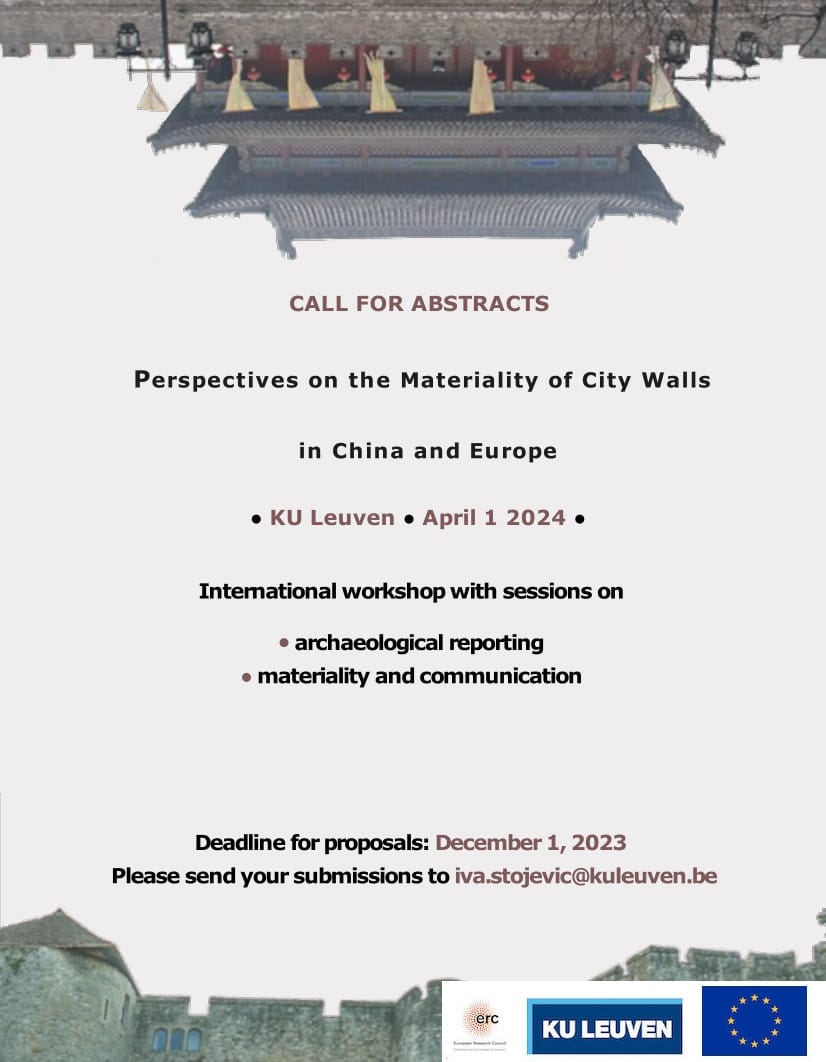
Jointly organized by the ERC-research project 'Regionalizing Infrastructures in Chinese History' (KU Leuven, Belgium) and NWO funded project 'The Lives and Afterlives of Imperial Material Infrastructure in Southeastern China' (International Institute of Social History Amsterdam, Netherlands)
Organizers: Iva Stojević, Taylor Zaneri, and Hilde De Weerdt
The projects 'Regionalizing Infrastructures in Chinese History' and 'The Lives and Afterlives of Imperial Material Infrastructure in Southeastern China' invite scholars of Chinese and European archaeology and history to participate in the international workshop 'Perspectives on the Materiality of City Walls in China and Europe'. The aim of this workshop is to bring together researchers working in different archaeological contexts to share best practices in the analysis of archaeological knowledge production, to identify key issues within existing practices, and to explore approaches to materiality in archaeology by examining case studies from various geographical areas and historical eras.
Participants are invited to submit preliminary position papers (up to 5 pages) which will be discussed during the two sessions. Travel for participants will be covered within Europe.
Panel 1: Archaeological reporting (10.00 - 12.30)
How researchers engage with the materiality of city walls, the capacity of those walls to modify the perception and action of humans, depends often on local approaches to the material. On one hand, archeological reports serve as a starting point for reconstructing archaeological knowledge-making processes in different locations and, by extension, for discerning theoretical trends and dominant ideas in archaeological science. On the other hand, archaeology is notorious for the amount of gray literature it creates. How do we facilitate access to this information as archaeologists? How do we extract meaningful data from them?
The reports, both published and unpublished, create opportunities to discuss methodological approaches, different frameworks, as well as blind spots of archaeological reporting. This panel invites researchers to examine how the materiality of city walls shape the perception and action of archaeologists, policymakers, and others who engage with the material remains of city walls in the present by addressing, among others, the following questions:
● Are there local, regional, and national trends in archaeological research on city walls (and infrastructure in general)?
● Are city walls a priority in choosing sites? Are certain time periods given priority?
● Is research on city walls only driven from above (i.e. by new infrastructure development and state-sponsored tourism), or does some of it come from below?
● Can digital technologies facilitate local, regional, and global comparative investigations of material remains of city walls?
Panel 2: Materiality and communication (14.00-17.00)
Andrea Mubi Brighenti and Mattias Kärrhold, in their introduction to Urban Walls: Political and Cultural Meanings of Vertical Structures and Surfaces (2018), refer to walls as material and semiotic technologies of inter- visibility management and walling as a technology of social interaction. In archaeological interpretations, city walls delineate ingroups and outgroups; they demonstrate seemingly clear borders between past and present regimes. In recent years the renewed interest in city walls as tourist attractions has made it so that city walls everywhere are treated as local/national symbols. City walls create bonds and barriers to this day; they are sources of safety and alienation, and in recent years walls are a source of revenue through tourism. They also influence city planning and community relations. This panel explores how city walls create social relations by examining, among others, the following questions:
● How are memories of city walls transmitted? What is the role of city walls in inculcating culture (generating habitus)?
● How are experiences of the materiality of city walls reflected in archaeological finds of different groups?
● How do city walls mediate the relationship between the sacred and the profane?
● How have city walls enabled infrastructural violence and inequality in the past? Do they have an impact on violence and inequality today?
● How can archaeological research into the materiality of city walls help us understand and address contemporary teichopolitics?
Deadline for abstracts (up to 200 words): December 1, 2023.
The workshop will be a hybrid event.
Please send your submissions to [email protected]